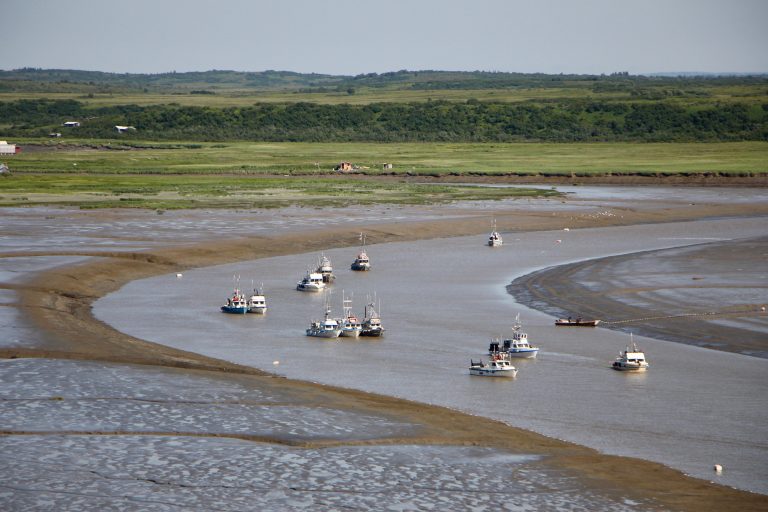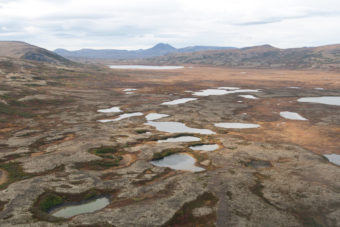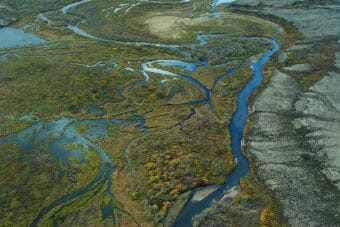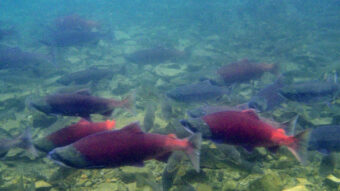
It was a momentous year for people who have fought for and against the proposed Pebble Mine.
The U.S. Army Corps of Engineers in November denied Pebble’s request for a federal permit, stopping the mine likely for good. The decision was met with mixed emotions from people in Bristol Bay.
Sue Anelon works for the Iliamna Development Corporation. She said the mine would have been a significant boost to village economies.
“I’ve seen the good and the bad,” she said. “When Pebble was here and a lot of people were working, they were paying for their own groceries, they were paying their own fuel. They were buying trucks, they were buying Hondas. People were paying for things. Now they can’t do that. They have to rely on the government.”
Billy Trefon Jr., a Nondalton resident, was elated by the decision.
“I was raised up listening to Elders telling me that, if you take care of the land, the land will take care of you,” he said. “And it has been doing that for centuries, milleniums. So to us this land is important. The water is important.”

Opponents of the project, like the United Tribes of Bristol Bay, have said that despite the Army Corps’ permit denial, they want to continue to push for long term protections for Bristol Bay.
Northern Dynasty and the Pebble Limited Partnership have promoted the controversial mine for more than a decade. In February, the companies proposed sewer repairs to three villages to help offset wetlands through sewer repairs. But some communities, like Nondalton, said they would reject any aid from the company.
“Our position is, we do not want anything from Pebble. Nothing,” said George Alexie, president of the Nondalton Tribal Council, which opposes Pebble.
The months leading up to Pebble’s permit denial were rocky for the company. In August, the Pebble Limited Partnership was told it needed to provide a new mitigation plan.
“I think it’s just, they have to go into more mitigation. That’s what I believe,” said Lisa Reimers, a board member of Iliamna Natives Limited. “Figure out what they need to get to the Army Corps to continue with getting them the information to get a [Record of Decision]. So I don’t think it’s the end of the story for Pebble, like everybody wants to believe it is.”
A few weeks later, secretly recorded tapes of Pebble CEO Tom Collier were released by the Environmental Investigation Agency. Collier resigned after the tapes were released.

The tapes also triggered new scrutiny of the state’s involvement in the permitting process.
“What the state chooses to do in order to create some fantasy mitigation plan that could satisfy legal requirements with the Corps has yet to be seen,” said Alannah Hurley, the executive director of the United Tribes of Bristol Bay. “And unfortunately, especially clear from this letter, they have a very strong advocate and partner in our governor.”
The mine would have been built at the headwaters of Bristol Bay. Scientists and environmental groups have continuously spoken out about its potential impacts to the ecosystem. A biologist talked about how the project could reduce the vitality of salmon in Bristol Bay.
“When you realize that the fish that breed and succeed in the Koktuli River are adapted to that specific place, then you realize that the fish are not interchangeable from place to place and in terms of impacts of development, that specific population is distinctly at risk, because the whole population is downstream of where a mine would be,” said Dan Schindler, professor of fisheries sciences at the University of Washington.
Pebble’s proposal also could have been another hindrance for beluga in the Cook Inlet.
“So when you look at all those things: the oil and gas dumping; the seismic testing; the regular spills from pipelines and leaks; the beluga whale faces a myriad of threats,” said Bob Schavelson, advocacy director for Cook Inlet Keeper.
“We’ve gotta do a better job of looking at these things. And the Pebble Mine is one more risk, one more stress that we don’t need for this declining population,” he said.
The Pebble Partnership said in a statement that the Army Corps’ decision was a “lost opportunity” for the region and that they plan to appeal the denial.



